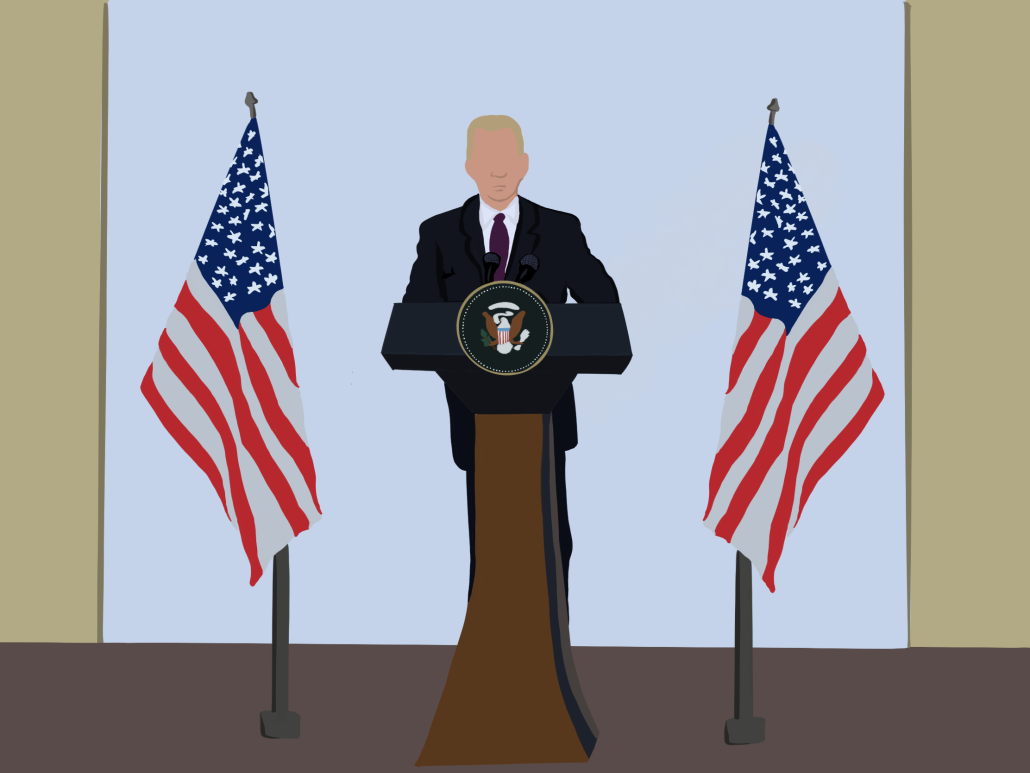Muddled State of the Union reflects Biden’s America

President Joe Biden gave his first State of the Union address Tuesday. In the wake of war in Ukraine, the ongoing coronavirus pandemic and rampant inflation, many Americans hoped for a rousing speech: one with political insight and a unifying message. Biden, not exactly known as a great orator, failed to completely hit the mark. Nonetheless, it still generated plenty of optimism for many Americans.
Beginning on a strong note, Biden condemned Putin and his “menacing ways,” along with expressing his deep admiration for the Ukrainian people. The room burst into bipartisan standing ovations after seemingly every new announcement he made about the ongoing Russo-Ukrainian crisis — whether it was the decision to ban Russian flights from American airspace, the global plans to release 60 million barrels of oil from reserves or the general commitment to “inflict pain” on Russia. Biden also criticized the crimes of Russian oligarchs, promising them that “we are coming for your ill-begotten gains.”
Overall, Biden’s message had all the typical themes you would expect. Frequent was the contrast posed between the West and Russia, with the conflict also framed as being between “democracy and autocracy,” freedom and tyranny, and light and darkness. Each of these comparisons enjoyed bipartisan applause from the audience.
But, of course, some degree of a “rally around the flag” effect is always inevitable. During wartime, patriotic rhetoric is difficult to mess up in the United States. The numerous areas that Biden stumbled in came throughout the rest of the address. For all the talk recently about “unprecedented times,” the vast majority of this speech and Biden’s ideas specifically were precedented. Rather than explicate any upcoming policy, Biden seemed more intent to play it safe, focusing primarily on highlighting past successes and reaching across the aisle towards Republicans on uncontroversial, common grounds.
Indeed, largely straying away from any technocratic specifics, Biden’s policies hardly seemed comprehensive throughout the speech. Inflation was only briefly discussed and, despite it being a direct responsibility of the Federal Reserve, Biden pinned the blame almost entirely on two other factors: corporations needing to “lower costs’’ and “global supply chain issues’’ — if you couldn’t have guessed that one. Astonishingly, there was zero mention of federal interest rates.
Biden then delved into a tangent reminiscent of former President Donald Trump as he repeatedly stressed the importance of American manufacturing while also vowing to “level the playing field with China.” In discussing domestic issues, meanwhile, concerns about student loan debt were omitted entirely. Biden then rejected progressive aims even further by proclaiming that “the answer [to neighborhood unrest and racial injustice] is not to defund the police. It’s to fund the police. Fund them. Fund them!” Immediately after — as if to remind Democrats again that he’s still on their side — Biden followed up this declaration with challenges for Congress to pass bills restricting gun ownership and protecting voting rights.
To be clear, plenty of the speech’s promises — especially the guarantee to cap insulin prices — were genuinely good. But Biden’s ideas lacked a certain ideological cohesiveness. Now, Biden’s appeal was admittedly never really meant to be about his platform. He’s always preferred to sell himself on his character and as him being a “return to normalcy.” In the Democratic primaries, he was the “most electable” candidate. In the general election, he was “not Donald Trump.” Now of course, the fact that a president who prides himself on being likable is so widely disliked is a long discussion itself. But what’s more important to acknowledge here is how the flaws of Biden’s address perfectly encapsulate the shortcomings of his administration.
For many Americans, Biden was meant to bring stability. Yet, the pandemic lingers even now. The inflation surge, dubbed as being “tertiary,” hit a 40-year high last month at a 7.5% annual rate. The prices of gas and higher education stand out particularly as abject absurdity, and, while it still remains deeply unlikely, the world is likely closer to World War III than it has been in decades. It’s hard not to blame Biden somewhat for these issues.
Ultimately, in the address, Biden undeniably came across as competent. The speech did the job. As far as the Ukraine crisis, Biden even did well — American exceptionalism seems to live on. But we as a country needed to see more. Americans needed Biden to prove himself a man of ingenuity, toughness and principle. Americans needed to see the true leader of the free world. Instead, Americans saw Biden as who he realistically is: a manufactured politician. Sure, from the start, Biden’s platform has always been curated down to the last iota, with each bullet point selectively highlighted based on popularity and each decision deliberately chosen for the path of least resistance. But the State of the Union, like Biden’s presidency itself, could and should have been something different, something more.
In the end, the speech may have qualmed some worries, as we are certainly returning to something of a status quo. But more than anything, Biden reminded us that American politics will always dwell within this game of strategic compromise — the bleak reality where the moderate will always rule, where consistency is excess baggage and where any profound convictions are irrelevant. So Biden brought back normalcy after all.

